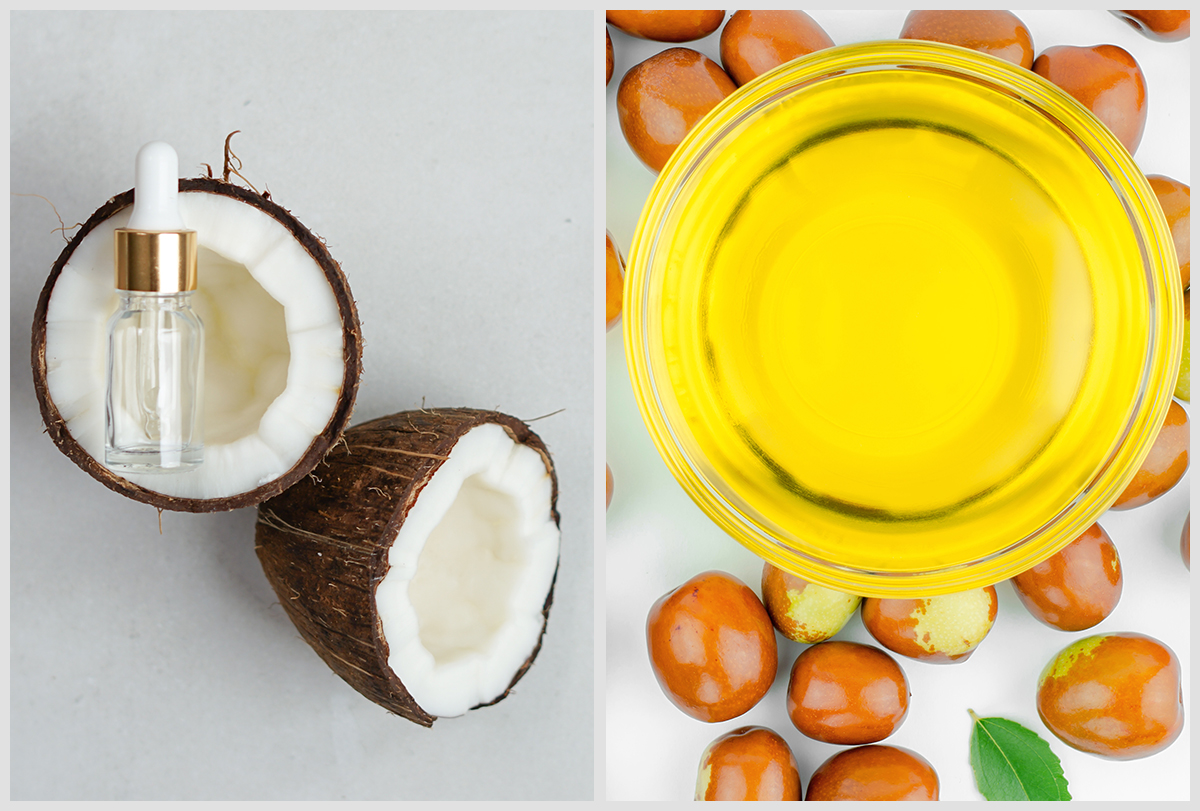Choices, choices, choices! Not having enough of them can be pretty annoying but having too many of them is also direly overwhelming.
If you have ever gone out to the grocery store, a hair care specialist, or the internet search bar to find hair care solutions and products, you know how there are more than a million options available.
Choosing a hair oil is no different. There are a thousand different types from a thousand different brands.
However, two oils that are very famous and stand out the most are coconut oil and jojoba oil. Both these oils are exceptionally good and beneficial for hair health.
So, how do you decide which one to choose?
The answer is not so simple. The choice of oil depends on your hair goals and current hair condition.
This article will help you determine which oil is more suitable for you based on different factors. Read on to make the right decision for your hair care.
What to Choose: Coconut Oil or Jojoba Oil?
To know which one is better for your hair, you have to take into account these:
For dry or oily hair
The first and foremost dictator of your choice of hair oil is your hair type.
If your hair is naturally oily, you would not need a hair oil that makes it greasier or heavier. But if your hair is more on the dry end, you would need a hair oil that is immensely hydrating and conditioning.
Coconut oil has a great nutritional profile and contains chemical compounds that can work excellently to condition dry hair. Researchers have also deemed coconut oil to have excellent emollient action, because of which it can trap moisture in your strands. (1)
However, coconut oil can make naturally oily hair weighed down. In such cases, jojoba oil is a great option. Experts claim that jojoba oil has the ability to control excess sebum (natural oil) production on the scalp. (2)
For straight or curly hair

Your hair texture defines your hair care needs. So, your choice of oil ultimately depends on whether you have curly or straight hair.
If you have curly or highly textured hair, you can choose either coconut oil or jojoba oil as both work well for such hair types.
Coconut oil has been found to provide a lot of benefits for textured hair and fight many hair problems that are commonly associated with curly hair such as brittleness. (3)
Jojoba oil, on the other hand, helps in defining your curls and keeping them looking healthy and shiny.
In short, for textured and curly hair that is struggling with poor hair quality and health, coconut oil is the right option, but if you only want an oil to support hair shine and style, use jojoba oil.
For straight hair, coconut oil can be a bit heavy and can make the hair greasy. So, jojoba oil is the proper choice for straight and nontextured hair.
For damaged hair
Both coconut oil and jojoba oil can help fix and manage damaged hair.
According to a study, coconut oil inhibits protein loss from the hair, thereby promoting and maintaining the integrity of the hair. Thus, coconut oil can do wonders for repairing damaged hair. (4)
Jojoba oil has a rich history of remedying hair problems. It has been used to address various issues, including scalp concerns and poor hair growth.
Jojoba oil contains wax esters, sterols, vitamins, and more, all of which can be immensely helpful for treating hair damage. (5)
For dandruff
Dandruff is a widespread scalp issue that impacts a lot of people globally. Coconut oil has come up as a popular remedy for maintaining scalp issues.
A 16-week study on 140 women revealed that topical coconut oil application helped support scalp microbiome balance that helps treat dandruff. (6)
Jojoba oil can also be helpful in controlling dandruff. Dandruff arises from scalp sebum imbalance (too much or too little sebum secretion), and jojoba oil can ensure a healthy sebum secretion. This helps rid dandruff and related issues. (2)
For graying of hair


Premature graying of hair is a common issue nowadays. Losing hair color was something people associated with aging, but with the incredibly stressful and chemical-filled life that men and women lead in modern times, the hair becomes gray way before one gets old.
Fortunately, there’s a solution for this. According to a study, coconut-based hair oils have shown protective effects on hair color.
Researchers observed that coconut-based hair oils effectively reduced hair porosity, improved hair strength, and provided substantial color protection. It works by shielding the hair from hair product-induced damage and preserving color vibrancy. (7)
Most-Asked Questions
Can jojoba oil clog pores?
No, jojoba oil is not known to clog pores and hence is good for oily scalps.
Can I use jojoba oil or coconut oil on chemically treated hair?
Yes, hair oils such as jojoba and coconut oil can be used to deal with damage that comes from chemically treating the hair.
Final Word
Choosing the right hair oil can be a challenge. If your hair is dry, coconut oil can provide hydration and repair, whereas jojoba oil is a great option for oily scalps.
Moreover, both oils work well for textured and curly hair. Coconut oil combats brittleness, while jojoba oil defines and adds shine to curls.
Both oils can also help manage dandruff and address damage caused by chemically treating hair.
